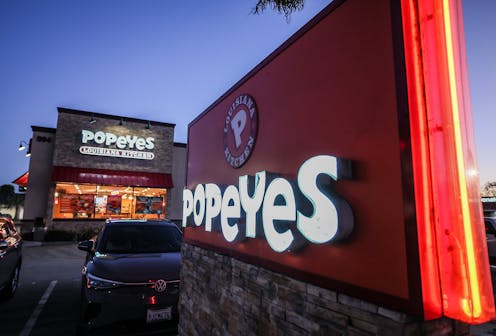Popeyes battle shows how big businesses protect their trademarks – even when they have no plans to come to NZ
- Written by Alexandra Allen-Franks, Lecturer and Co-director of the New Zealand Centre for Human Rights Law, Policy and Practice, University of Auckland, Waipapa Taumata Rau

At first sight, the battle between a Manawatū fish-and-chip[1] shop and a Louisiana-based chicken joint over the name “Popeye’s” reads like a classic David and Goliath battle. An international giant pushing out the little guy with the threat of an expensive, and potentially lengthy, court case.
But in reality, it’s a little more complicated.
It’s a story about the intricacies of New Zealand’s trademark rules, missed opportunities, and just how proactive some international businesses have been in protecting their interests across the globe.
To understand why a small takeaway business in the middle of New Zealand was forced to change its name, it’s important to be aware of the intricacies of New Zealand’s trademark legislation, and what it means for global brands like In-N-Out Burger and local treasures such as Georgie Pie.
Protecting the brand
A trademark can be a whole range of things – a word, a name, a logo, a shape, a smell, a sound – as long as it provides a message to consumers that the trademarked item comes from a particular source. The makers of Mother energy drinks and V energy drinks[2], for example, battled it out in court for five years over a particular shade of green.
Anyone can apply to register a trademark with the Intellectual Property Office of New Zealand IPONZ[3]. Once the office receives an application, it’s checked against the register to see whether it’s similar in any way to other trademarks.
Dates are very important in trademark law. Older trademarks almost always take precedence over newer ones. One exception to this rule is that the older trademark’s owner can consent to registration of the newer trademark. The newer trademark holder can also try to prove “honest concurrent use” alongside the older mark.
Importantly, IPONZ publishes details of the applications it’s considering to allow for challenges from other businesses.
New Zealand law doesn’t tend to allow trademark registration if it’s simply descriptive of the goods or services being applied for. Someone couldn’t trademark the word “juice”, for example. But the owner of the Just Juice trademark will have provided evidence to show the public associates their brand name with their particular juice and not all juices in general.
Use it or lose it
A successful trademark application affords the owner the right to stop anyone else from using it on similar products[5] for as long as renewal fees are paid.
But what happens if the owner of a trademark never uses it? Trademarks can be challenged and removed. One ground of challenge is where a company can show the owners of the trademark haven’t genuinely used the mark in the three-year period leading up to the challenge.
The fact registered but unused trademarks are vulnerable for removal is why New Zealand occasionally sees pop-up restaurants from companies that may be unlikely to permanently set up shop.
In-N-Out Burger has had a New Zealand trademark registration for its logo since 1991, for example. No other food-related business can call itself “In-N-Out”.
But there are no actual In-N-Out restaurants in New Zealand. The trademark continues to exist because every few years In-N-Out opens a temporary pop-up restaurant. This happened for six hours in 2023[6], for three hours in 2020[7], and for 90 minutes in 2013[8].
It’s also one of the reasons why McDonald’s, which has 21 trademarks related to its Georgie Pie brand, with the oldest dating back to 1976, occasionally has limited releases of Georgie Pie products[9].
International businesses with New Zealand trademarks know they are at risk of losing their rights if they don’t use their marks. The pop-ups and limited releases are steps to prevent that from happening.
NZ businesses must be vigilant
Popeyes’ trademark registrations in New Zealand date back to 1976. As Popeyes only recently opened in New Zealand, it’s likely there were significant periods over the past 48 years when the 1976 trademark wasn’t being used.
Had someone made an application to remove it, it’s likely it would’ve been removed from the register. But that didn’t happen and it’s now too late. Popeyes is officially using its trademark and can’t be removed for being inactive.
The lesson for New Zealand-based businesses is that it’s necessary to search the trademarks register[10] to see whether there are existing claims over the name they want to use, and to be active if they believe a trademark has fallen dormant.
Once an international business gets a registration in New Zealand, it can keep that registration alive for decades – even if it only uses the mark for a couple of hours every few years.
References
- ^ Manawatū fish-and-chip (www.rnz.co.nz)
- ^ Mother energy drinks and V energy drinks (www.stuff.co.nz)
- ^ IPONZ (www.iponz.govt.nz)
- ^ Robert Gauthier/Getty Images (www.gettyimages.com.au)
- ^ stop anyone else from using it on similar products (www.legislation.govt.nz)
- ^ six hours in 2023 (www.stuff.co.nz)
- ^ three hours in 2020 (www.stuff.co.nz)
- ^ 90 minutes in 2013 (www.stuff.co.nz)
- ^ limited releases of Georgie Pie products (franchise.co.nz)
- ^ trademarks register (app.iponz.govt.nz)
Authors: Alexandra Allen-Franks, Lecturer and Co-director of the New Zealand Centre for Human Rights Law, Policy and Practice, University of Auckland, Waipapa Taumata Rau














